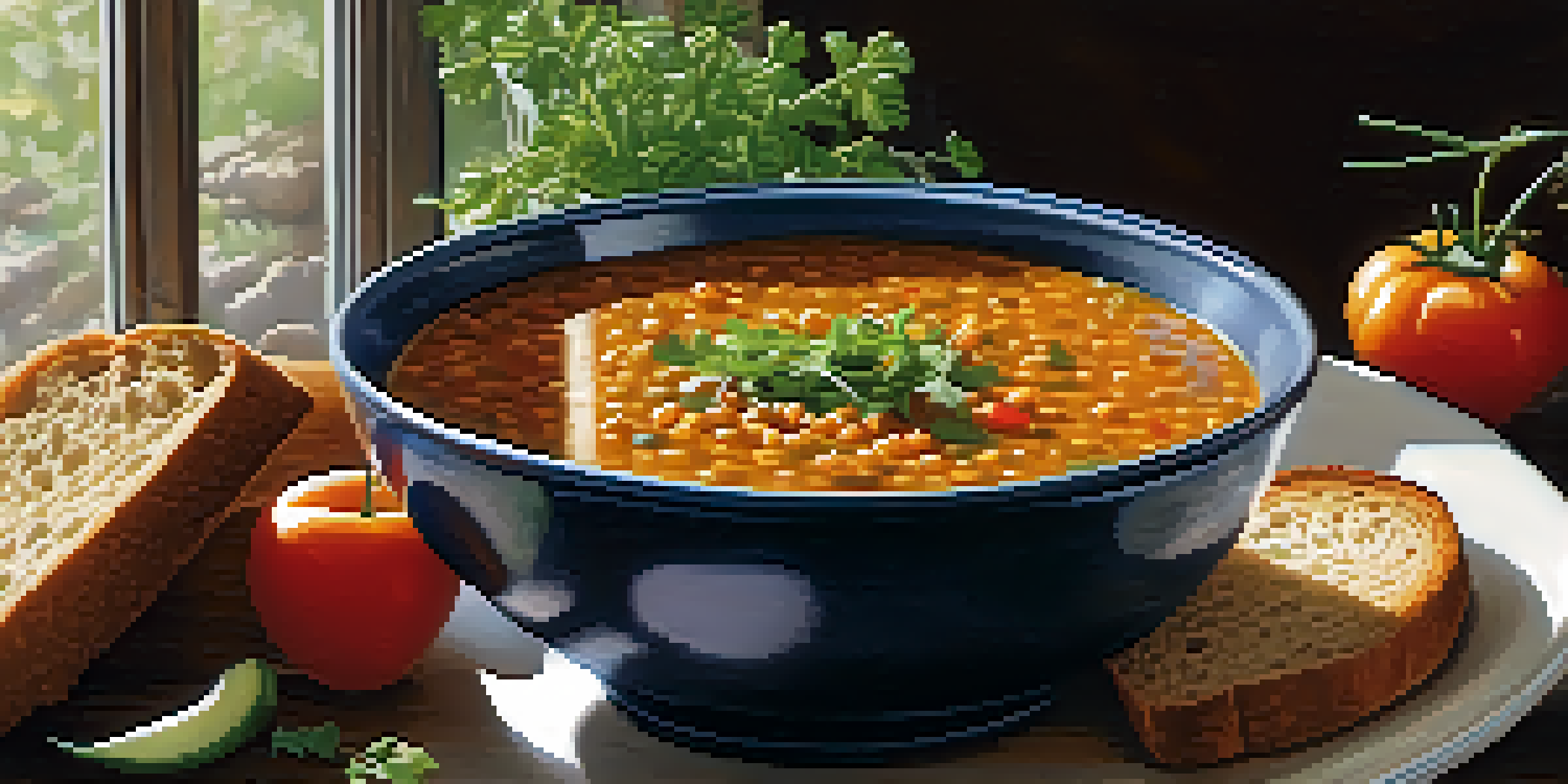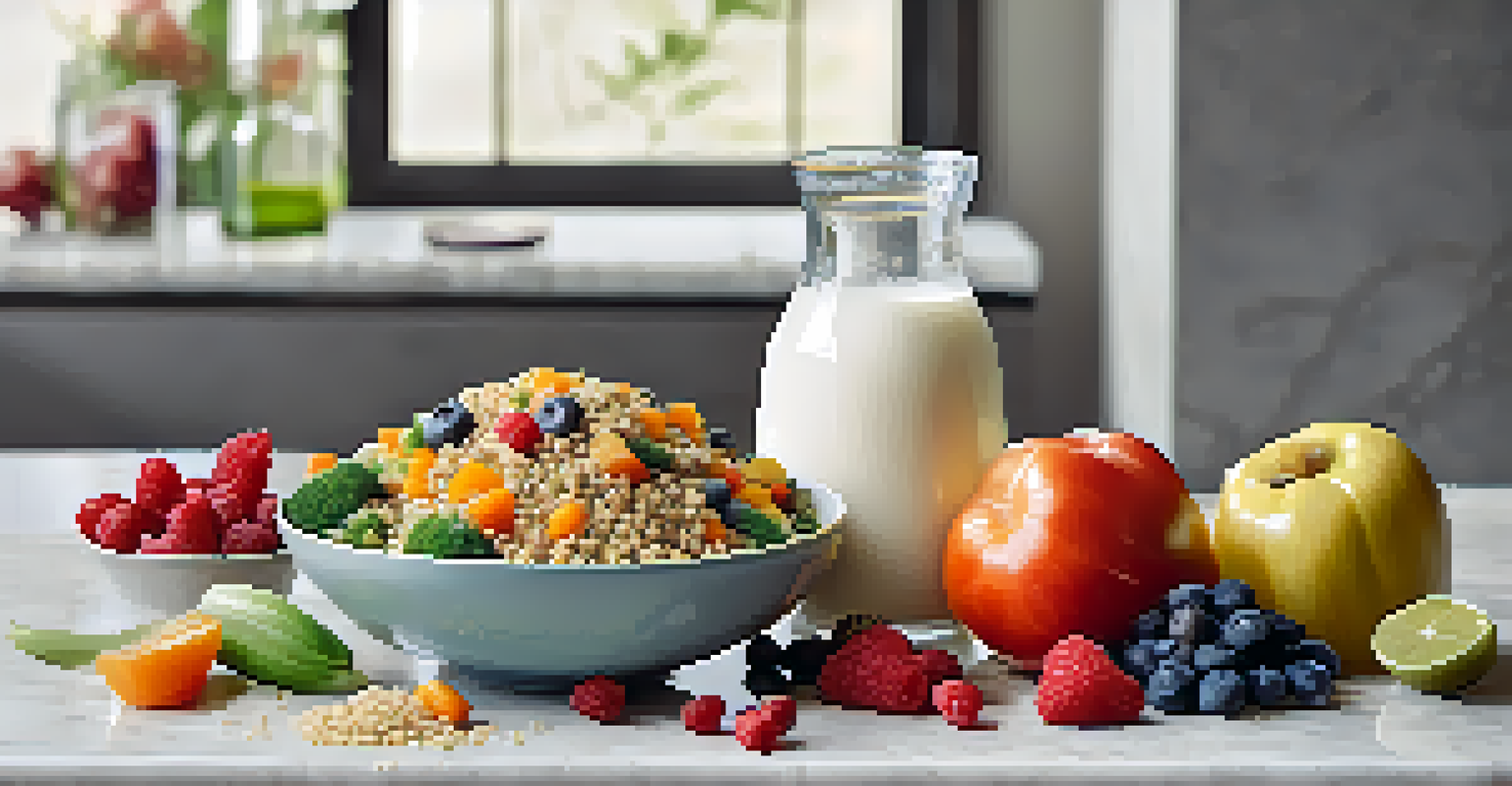Top 10 Nutrients in Vegetarian Diets for Seniors' Health

Importance of Balanced Nutrition for Seniors
As we age, our nutritional needs change significantly. A balanced diet is crucial for seniors to maintain energy levels, support immune function, and promote overall health. Particularly for those following a vegetarian diet, understanding essential nutrients becomes even more important.
Let food be thy medicine and medicine be thy food.
Seniors may face challenges like reduced appetite and dietary restrictions, making it vital to ensure they receive adequate nutrients. Incorporating a variety of food sources can help address these challenges while offering delicious options. This article will delve into the top nutrients that are particularly beneficial for seniors embracing vegetarianism.
By focusing on these key nutrients, seniors can enjoy a vibrant lifestyle and minimize health risks. So, let’s explore each nutrient and its benefits in a vegetarian diet!
Protein: The Building Block of Health
Protein is essential for repairing tissues and maintaining muscle mass, which can decline with age. For seniors on a vegetarian diet, sources of protein include beans, lentils, tofu, and quinoa. These options not only provide protein but also come packed with other vital nutrients.

Incorporating protein into every meal can help sustain energy levels throughout the day. For instance, a hearty lentil soup or a quinoa salad can serve as delicious sources of protein while being easy to prepare. This makes it simpler for seniors to enjoy their meals without feeling overwhelmed in the kitchen.
Balanced Nutrition Supports Seniors
A balanced diet is essential for seniors to maintain energy, support immune function, and promote overall health, especially for those following a vegetarian diet.
Moreover, adequate protein intake can support bone health and help prevent osteoporosis, a common concern for aging individuals. Thus, focusing on protein-rich vegetarian foods is a smart strategy for seniors.
Fiber: A Friend for Digestive Health
Fiber is a crucial nutrient that aids digestion and helps prevent constipation, a common issue among seniors. Vegetarian foods like fruits, vegetables, whole grains, and legumes are excellent sources of dietary fiber. Including a variety of these foods in daily meals can significantly improve digestive health.
Eating well is a form of self-respect.
In addition to promoting regularity, fiber can also help manage blood sugar levels and lower cholesterol. Consider a morning oatmeal topped with berries or a colorful salad for lunch to boost fiber intake effortlessly. These meals are not only nutritious but also vibrant and appealing.
Moreover, a fiber-rich diet can contribute to satiety, helping seniors feel full and satisfied without overeating. This makes it easier to maintain a healthy weight, an important factor in overall health as we age.
Calcium: Essential for Strong Bones
Calcium plays a vital role in maintaining bone density and preventing fractures, making it especially important for seniors. For those following a vegetarian diet, dairy products like yogurt and cheese are excellent sources of calcium, along with fortified plant-based milk and leafy greens.
Incorporating calcium-rich foods into meals can be both simple and delicious. For instance, adding spinach to smoothies or enjoying a slice of cheese on whole-grain toast can enhance calcium intake effortlessly. This not only supports bone health but also encourages a varied diet.
Key Nutrients for Vitality
Including protein, fiber, calcium, iron, omega-3 fatty acids, vitamin B12, and zinc in a vegetarian diet can enhance health and well-being for seniors.
It's important to pair calcium with vitamin D, which aids in calcium absorption. Seniors can get vitamin D from fortified foods or through sunlight exposure, so it’s wise to monitor these nutrients together for optimal bone health.
Iron: Vital for Energy and Vitality
Iron is essential for producing hemoglobin, the protein in red blood cells that transports oxygen throughout the body. Seniors, especially women, may need to pay attention to their iron levels, as they can become depleted over time. Vegetarian sources of iron include lentils, chickpeas, tofu, and fortified cereals.
To enhance iron absorption, pairing these foods with vitamin C-rich items like citrus fruits or bell peppers can be beneficial. For example, a chickpea salad with lemon dressing not only boosts iron intake but also adds a refreshing flavor. This small adjustment can make a big difference in nutrient absorption.
Maintaining adequate iron levels can help combat fatigue and improve overall energy levels. It's crucial for seniors to be mindful of their iron intake to remain active and engaged in their daily lives.
Omega-3 Fatty Acids: Heart and Brain Health
Omega-3 fatty acids are known for their heart-healthy benefits and their role in brain health. For seniors, incorporating omega-3s can help reduce the risk of heart disease and support cognitive function. Although fish is a primary source of omega-3s, vegetarians can turn to flaxseeds, chia seeds, and walnuts.
Adding these ingredients into smoothies, salads, or snacks can make it easy to boost omega-3 intake. For instance, a smoothie with flaxseed or a handful of walnuts can be both nutritious and delicious. This not only enriches the diet but also supports brain and heart health.
Diverse Foods Boost Nutrient Intake
Incorporating a variety of vegetarian food sources helps seniors meet their nutritional needs while enjoying delicious and satisfying meals.
Regular consumption of omega-3s can also help reduce inflammation, an important factor in many chronic diseases. Thus, ensuring adequate intake through vegetarian sources is a smart choice for seniors.
Vitamin B12: A Key to Energy and Nerve Health
Vitamin B12 is crucial for nerve function, red blood cell formation, and energy production. Since B12 is primarily found in animal products, seniors on a vegetarian diet may need to be mindful of their intake. Fortified cereals, nutritional yeast, and dairy products can help meet B12 needs effectively.
Including fortified foods in daily meals can make a significant difference. For example, a breakfast of fortified cereal with milk can provide a solid start to the day. This simple addition can ensure seniors are getting enough B12 without significant effort.

Regular monitoring of B12 levels is essential, particularly for seniors, as deficiencies can lead to fatigue and cognitive issues. Therefore, being proactive about B12 intake is key to maintaining overall health.
Zinc: Supporting Immune Function
Zinc is a mineral that plays a crucial role in supporting the immune system and promoting wound healing. For seniors, adequate zinc intake can be vital for maintaining health and preventing illness. Vegetarian sources of zinc include beans, nuts, seeds, and whole grains.
Incorporating zinc-rich foods into meals can be both simple and satisfying. A hearty bean chili or a handful of nuts as a snack can easily boost zinc levels. These options not only enhance the diet but also provide a healthy dose of energy.
Moreover, zinc is essential for taste and smell, which can diminish with age. Ensuring sufficient zinc intake can help seniors enjoy their meals more fully, contributing to overall well-being.